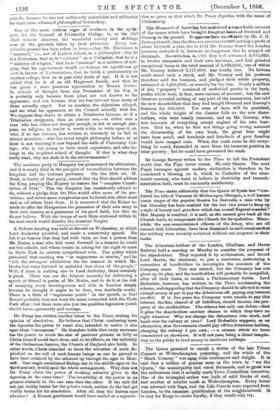The Economist of Saturday lasteaestained le:remarkable account ,of the causes
which have brovht Idle-greet ihouse of Overend and Gurnef to the ground. It appease fAim an: affidavit by Mr. J. H. Gurney himself, that the firm was previous to 1860 netting a profit of about 190,000/. a year, but in 1861 Mr. Gurney found the London partners embarked in business so dangerous that he stopped all 4ivideads. Neverthelease,in 1866 they had advauced 3,5000651. to twelve companies and their own railways, and had granted exceptional loans to the total amount of. 4,199,000/., out of which Mr. Gurney believed 3,117,000/. was totally lost. No fortune could stand such a shock, and Mr. Gurney and his partners therefore sold the business, and pledged their whole property, estimated at 3,805,0601., as security for the loss. Nearly a million of this " property " consisted of undivided profits in the bank, profits which were, in fact, mere matter% of account ; but the new directors revealed nothing of any part of the transaction, but told the new shareholders that they had bought ()reread and Gurney's business for 500,000/. Yet none of them will be punished, and the whole weight of the disaster falls on the new share- holders, who were totally innocent, and on Mr. Gurney, who was innocent of everything except neglect of his own busi- ness. Had he, when he first saw things going wrong, assumed the dictatorship of hie own bank, the great firm might have been saved, and huudreds and hundreds of peer familiec. would have escaped ruin. When the, crash came he did every.. thing he could, descended at once from his immense position tn. utter poverty ; but he. could have prevented the cresh.






























 Previous page
Previous page